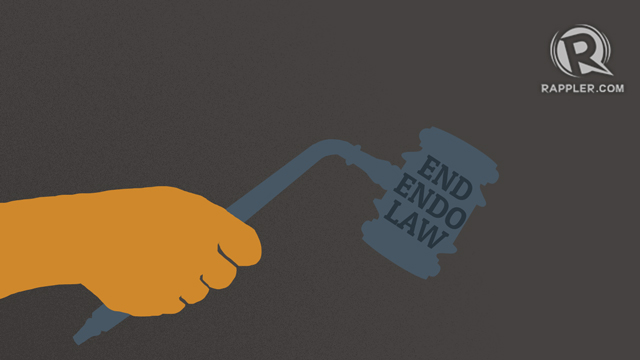

When the Senate passed what it called the “End of ENDO Law” on May 22, 2019, many wanted to believe that the widespread bane of contingent, short-term employment suffered by countless Filipino workers would finally, well, end.
However, subsequent events would prove that the title given to the proposed law is misleading. Workers and workers’ groups such as the Sentro ng mga Nagkakaisa at Progresibong Manggagawa (SENTRO) have since seen that even if the “End of ENDO Law” is enacted, endo will continue to live on.
In this piece, I identify why the proposed law misses its target. But first, I clarify the nature of the problem that we have come to know as endo.
We start with the fact that our Constitution guarantees to all workers the right to security of tenure, that is, the right to continue in one’s employment unless the correct procedure to terminate employment is followed and, as important, unless there is a just reason to terminate the worker’s services.
Article XIII, Section 3 of the Constitution provides that all workers shall be entitled to security of tenure, humane conditions of work, and a living wage.
However, employers have, through the years, developed ways of engaging workers which actually result in denying workers their right to security of tenure.
Here are two such ways:
Use contracts with a fixed term employment. Under this scheme, all an employer has to do is include a fixed-term provision in an employment contract. On the last day of the fixed term, the service of the worker is terminated regardless of his or her quality of work. The employee will then be employed only for the fixed – and typically very short – period in the contract. At the “end of contract” – endo – the workers lose their livelihood.
It should be noted that while the fixed term in these contracts could actually be any length of time, the fact that employment contracts typically contain provisions limiting tenure to only 3 to 5 months at a time tends to demonstrate an intent to deny workers their security of tenure. This intention is further shown by the added fact that workers terminated due to endo are subsequently replaced with persons under the same fixed term employment scheme.
Hire workers through “third party service providers” we have now come to know as “agencies” or “contractors.” Under this scheme, employers are considered as “principals” who benefit from what the workers do but, at the same time, are able to displace the usual liabilities of an employer to the third party.
Figure 1: Traditional Employment

Fig. 2 Hiring through an agency erodes security of tenure

Under this arrangement, when agency workers are not paid wage-based benefits such as overtime and holiday pay, the principal (who is supposed to be the employer) can point to the agency and say: “Don’t look at me!” Even worse, when the principal tells the agency to stop the employee from reporting to work, the employee immediately loses livelihood. This, even if there is no reason under the law to terminate the employee’s employment. The workers’ tenure in this arrangement is extremely insecure.
Combing the two methods
Employers have come to combine these two ways of hiring workers such that employers, instead of hiring directly, contract out services through agencies.
These agencies in turn hire workers under fixed term employment contracts where the duration of employment does not depend on whether or not the worker performed well but solely on the expiration of an arbitrary period. The combination of indirect hiring and the use of fixed term employment contracts effectively defeats the Constitutional guarantee of security of tenure.
In this light, one can hardly be surprised by the prevalence of this practice.
We have seen workers engaged under short-term arrangements in malls, department stores, airlines, banks, restaurants, hotels, resorts and practically everywhere we go. They are our fathers, mothers, brothers, sisters and friends.
Under these arrangements, employers or principals are able to have their proverbial cake and eat it too. They benefit from the work of the employee but are still able to point to the agency in case claims for payment of benefits or claims of illegal termination are made.
Why the proposed 'End of ENDO Law' fails
I identify the 3 main reasons why the “End of ENDO Law,” despite its title, fails. ('Endo' bill now up for Duterte's signature)
First, its current version does not prohibit fixed-term employment. Put in plain terms, the law which claims to end endo does nothing to address the use of fixed term employment contracts – the very root of endo.
Thus, even if the “End of ENDO Law” is enacted, workers will lose their livelihood after a very brief time of employment. As a number of workers have told me, “bagong pasok pa lang kami sa trabaho, naghahanap na agad kami ng susunod na papasukan.”
Second, even as the law tightens the regulation on agencies supplying workers to principals (an amendment favored by some), the current version of the “End of ENDO Law” contains a regressive amendment to the Labor Code with regard to the liability of principals. Specifically, it diminishes the ability of workers to hold principals and contractors solidarily liable.
Presently, under Article 109 the Labor Code, every employer is liable with the contractor for ANY violation of ANY provision of the Labor Code. This remedies the tendency of the employer to displace legal liability to a third party. Therefore, under the present law, a worker hired through an agency can bring suit simultaneously against both the principal and the agency for unpaid wages and other benefits such as overtime pay, holiday pay, and service incentive leaves.
But the proposed “End of ENDO Law” amends Article 109 to limit the solidary liability of the principal only to claims for wages, specifically Title II, Book III of the Labor Code. It thus seems that upon the enactment of the “End of ENDO Law,” workers’ claims for benefits such as overtime pay, holiday pay, premium pay for rest day work, and service incentive leaves would be possible only against the agency. They can no longer be made against the principals.
In this way, the “End of ENDO Law,” instead of giving more protection to workers, actually takes away protection which the law now gives workers. Ang sigaw ng manggagawa ay hakbang pasulong. Sa kasamaang palad, ang naganap ay hakbang paurong.
Third and last, the “End of ENDO Law” provides a penalty of up to P5 million against any labor only contractor. Given that the present law does not provide as high an amount of penalty, some choose to see this aspect of the proposed law positively.
However, it should be pointed out that, aside from the offense of acting as a labor only contractor, no other act is penalized by the proposed law. In particular, there is no penalty for those who act as job contractors without a license. Neither is there any penalty for those who deprive workers benefits such as overtime pay, holiday pay, and service incentive leaves; nor for those who misclassify workers to deny them their right to security of tenure.
Without penalties sufficient to deter wrongdoing other than labor only contracting, one is left to wonder how the “End of ENDO Law” will be able to achieve its ends.
After years of advocating an end to endo, many workers and workers’ organizations such as SENTRO were eager to join in celebrating the promised law which would finally address the problem of short-term, contingent, and vulnerable employment.
However, under the shadow of the 3 reasons I have identified, the current version of the “End of ENDO Law” fails to realize its promise and leaves much work for workers and advocates.
We continue to do such work with the enduring hope that a new law which truly ends ENDO will one day come to pass. – Rappler.com
Arnold F. de Vera is a labor law practitioner and law professor in various schools. He received his Bachelor of Laws degree from the University of the Philippines College of Law and later completed his Master of Laws as a Global Public Service Law Scholar at the New York University School of Law. He is counsel for the Sentro ng mga Nagkakaisa at Progresibong Manggagawa (SENTRO) and other workers’ organizations.